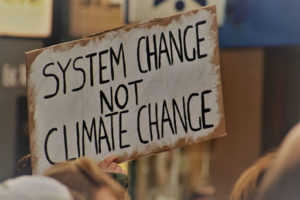This is the sixth blog in our Examining Climate series, where CCJ staff members and others are sharing their favorite (or least favorite) climate solution, looking at the benefits and the costs in the hope of sparking an honest conversation about how we address the climate crisis and keep our focus on environmental justice. This blog was written by Communications Manager Lisa DePaoli.

It’s not often that environmental justice communities are centered in discussions about the solutions we need in order to address climate change. This is unfortunate for one critical reason: people who are most impacted by the climate crisis are the ones who know what has to happen to bring about real solutions.
In March, Grist and Climate Justice Alliance (CJA) offered an important webinar titled Climate Solutions from the Frontlines of Environmental Justice, in which CJA members – all environmental justice organizations and climate leaders – discussed how we can center equity and justice while tackling the climate crisis with real, community-driven solutions. We highly encourage you to watch the webinar here. The discussion is about an hour long, and it covers a range of topics related to climate.
There were a number of important issues raised in the webinar, but we want to highlight two here, as they are important for our own communities in Washington and Greene County to consider.
First, the idea of false solutions, which are no more than bandaid approaches that don’t actually reduce greenhouse gasses at the rate we need nor strengthen communities’ resilience. These were referred to as “technofixes” in the webinar. It is important that we reject these for our communities, as they both cause harm and waste efforts, time, and resources rather than move us to a sustainable economy.
Many of the emerging technologies being marketed as climate “solutions” are no more than a form of greenwashing. Among them are carbon capture and storage, hydrogen, bitcoin, and the use of waste coal. In addition, many if not most of them also require subsidies or government money to implement. Is this really the best use of our money?
We need immediate action on energy to move from a fossil fuel economy to a living, regenerative economy. We need to shift fossil fuel subsidies into renewable energy and move toward community-driven solutions in order to actually deal with the problem at the root, not keep treating the symptoms.
A real solution would be to allow community ownership, for example, in the form of food and energy co-ops. Cassia Herron of Kentuckians for the Commonwealth (KFTC) states that they are “working toward an economy that is shared, that values people and our land.” In Kentucky, rural electric coops have developed financing programs that allow homeowners to make pretty low amounts of money every year to be able to invest in energy retrofits on their houses, to save money and then invest that money back into their communities.
Similarly, community solar programs are becoming popular across the U.S.; about one-third of states allow it. Community solar is “any solar project or purchasing program, within a geographic area, in which the benefits of a solar project flow to multiple customers such as individuals, businesses, nonprofits, and other groups. In most cases, customers are benefitting from energy generated by solar panels at an off-site array.” However, community solar is not allowed in Pennsylvania. It requires virtual net metering (VNM), which no utilities in Pennsylvania have allowed yet (VNM is meters on multiple properties that are linked to a single solar array on another property). In order to change this, lawmakers need to pass new laws and rewrite utility regulations. Advocating for solar is the best way to help its expansion. Every pro-solar person, with or without panels on their homes, can help make a big difference in standing up to legislation and utility company pressures. Check out this article from EcoWatch to learn more about how to be a solar advocate.
Second, it is imperative that going forward, we are grounded in the wisdom and experience of frontline communities and workers. The people who are directly affected must be brought into these discussions from the beginning and they must be heard. We have to continually challenge even the climate, environmental, and conservation movements to listen to frontline voices and to include us in their agenda. The overwhelmingly white national environmental organizations – what are sometimes referred to as “big greens” – need to be true allies confronting environmental injustices. Green groups also need to be more accountable to their actions or inactions on various fronts.
In the webinar, when asked “Where do the answers lie for a truly just and sustainable world?” Cassia Herron replied “We’re trying to build a local food co-op in our community, but it is viewed as a risk to invest in our communities because it hasn’t been done. But the risk is not to try anything new. It is a risk to continue to do the same things and to continue to put money into the same folks and not to invest that money into the folks who are facing the effects of climate change every day. That’s the risk: Not empowering local people to come up with the solutions!”
It is critically important that we don’t waste time and resources investing in false solutions when we deserve something real, and moving forward, discussions about real solutions need to include frontline voices and ideas. We need to go into a Just Transition, which means getting workers good jobs, fixing up our communities, letting us dictate where money goes in our communities, and being trusted as stewards of the land that we live on.


Excellent article. I live in PA and did not know vnm was not allowed — will write to my senators.
Thanks for your comment, Holly, and for writing to your senators!